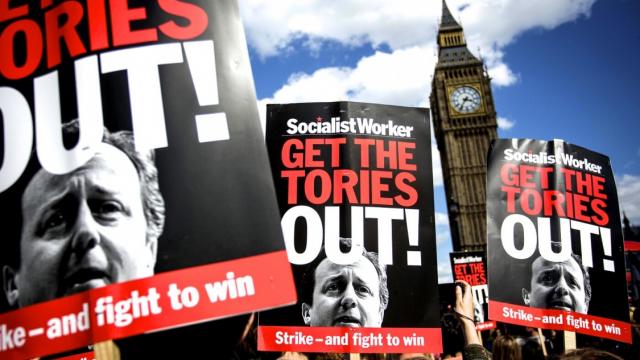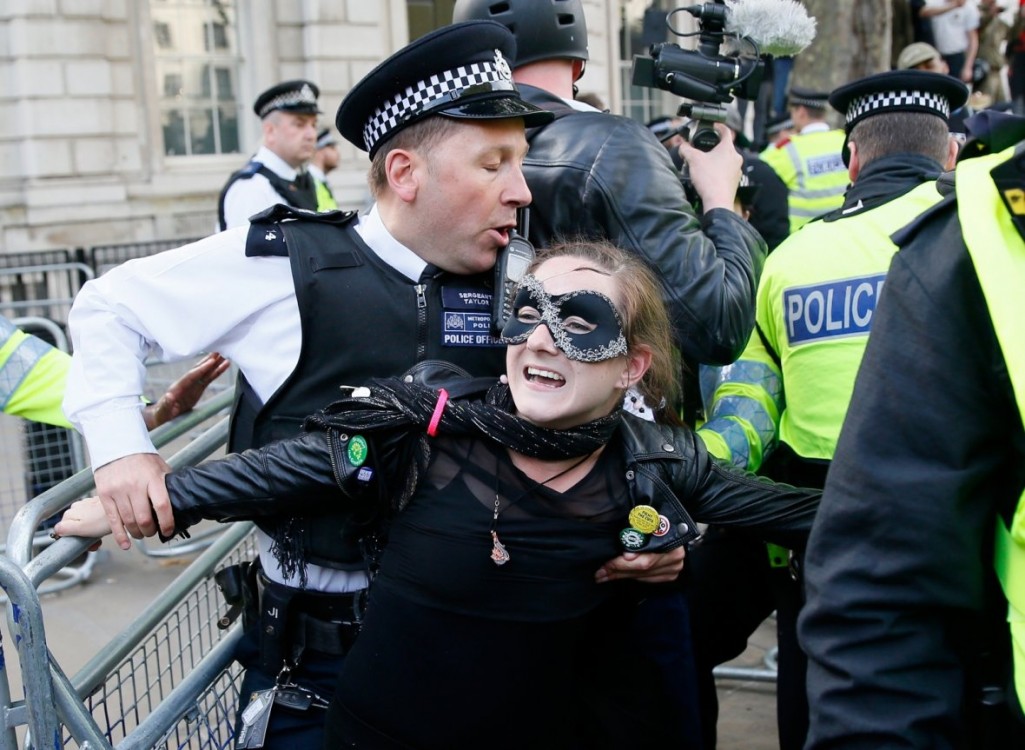
Recently, Britain's less politically vocal under 25s, whose penchant to not vote has long been the bane of politicians, are gathering political momentum and emerging as a potent voice of opposition to the government.
The most immediate cause of this movement is the 2015 U.K. Budget, which will be remembered most for leaving the nation’s most vulnerable behind. With no coalition to stifle the Conservatives' painful austerity agenda, the newly-elected Tory government last month let rip into the welfare state, slashing benefits and targeting not only the sick and the poor – but more injudiciously, the young.
In their election campaign, Conservatives talked about making Britain a more optimistic place for youngsters, but the Chancellor’s Budget was a particularly vicious attack on that demographic. The youth-targeted cuts include scrapping housing benefits for under 21s, ensuring the new higher minimum wage won’t apply to under 25s, removing Jobseeker's allowance from the young, and limiting the child tax credit to only the first two children in a family.
These harsh cuts to the welfare system come on top of Chancellor of the Exchequer George Osborne’s previous austerity measures aimed at younger members of society, including stripping them of education maintenance, shrinking child benefits, upping tuition fees, cutting careers advice and shedding youth services.
It’s no wonder that Britain's young people are saying they feel particularly exposed by the cuts – and that amidst all the slashing, a new tide of resentment is brewing among the country's youth.
For example, the June anti-austerity protests that took place in London, Glasgow, Liverpool and other cities across Britain saw many young protesters joining in the rallies, keen to show their angst and make their mark.
One demonstrator in London was 16-year-old Owen Winter, who marched with a placard that read, “Your cuts, our future.”
“I’m demonstrating because I feel that the cuts are particularly harsh for young people and affect them quite negatively, and I think that I’m going to grow up dealing with the repercussions," Winter, who got up at 5:30 a.m. to reach the demo in time from Cornwall, told The Guardian. "Generally, I think young people get a raw deal out of politics.”
Marching with Winter was Morgan Centini, also 16, who said, “I’ve grown up in an environment where I’ve watched the public sector in my home town destroyed. Watching the cuts rip apart a community, I can’t put it into words really. It’s disgusting.”
Prime Minister David Cameron, in a speech to the Conservative Spring Forum, said young people are finishing their exams and “heading straight on to welfare.” But youth across the country beg to differ – and aside from showing up more regularly at demonstrations, they're now also looking to intellectual and left-wing luminaries to guide their political response.
In a recent speech in London, Nobel Prize-winning economist Joseph Stiglitz said that as more and more young people are feeling let down by mainstream politics, it's no surprise that anti-austerity figures have emerged to capture their hopes and harness their passions.
Stiglitz was referring in particular to Jeremy Corbyn, one of the main contenders for the Labour leadership race, who was initially thought to have joined the fight merely to "balance the numbers" and make the contest more diverse – but who, in the wake of the painful Budget and the austerity resentment now snowballing in Britain, has presented genuinely left, anti-austerity policies that are gathering support particularly among Britain’s youth.
According to Stiglitz, Corbyn has emerged as a favorite contender because policies from center-left governments like Tony Blair’s had “undermined the middle-ground message, partly by entrenching wealth for the very few.”
“I am not surprised at all that there is a demand for a strong anti-austerity movement around increased concern about inequality,” saidthe former World Bank economist and author, most recently, of "The Great Divide: Unequal Societies and What We Can Do About Them."
Also recognizing the "dire inequality" in Britain was 29-year-old Welsh singer Charlotte Church, who swung her public support for Corbyn writing that he was somebody who had a chance to create a “shift in the paradigm, from corporate puppetry to conscientious social representation.”
The politically active musician joined Corbyn at the anti-austerity rally in London in June, calling for the country to rally to “save ourselves from decades of yuppie rule,” and branding austerity as “unethical, unfair, unnecessary [and] a big lie.”
Katie Jackson, a 21-year-old office administrator and mother of two in Manchester, shared Church’s resentment toward the government’s austerity cuts, which she said fall particularly hard, and unfairly, on young people.
“They are telling me if I have another child I won’t be able to receive any more child tax credits for my third child. I am a young mum on a low wage struggling to make ends meet. I feel my choice of how many children to bring into this world is being shaped by this Conservative government,” said Jackson.
“I would definitely be in support of a government which offered a fairer alternative that didn’t target the poor and didn’t target the young,” she added.
With the threatened hacks to the welfare state becoming a painful reality, the "gentler" form of austerity promised by more center-left figures like "New Labour" leader Blair, and more recently the Labour leader Ed Miliband, are no longer making the grade.
Instead, individuals who offer an uncompromising stance against austerity may prove to be the Conservatives’ biggest threat – and the greatest champion of today's generation.
3 WAYS TO SHOW YOUR SUPPORT
- Log in to post comments
















